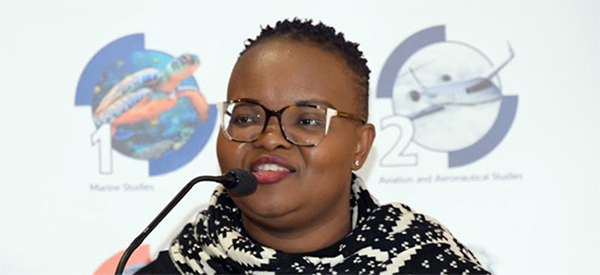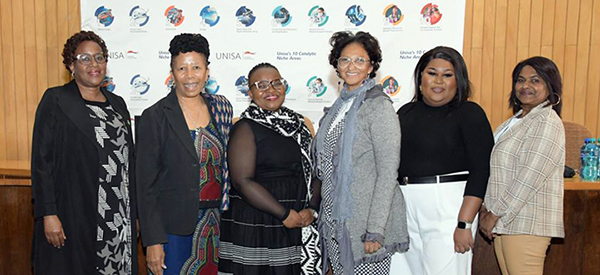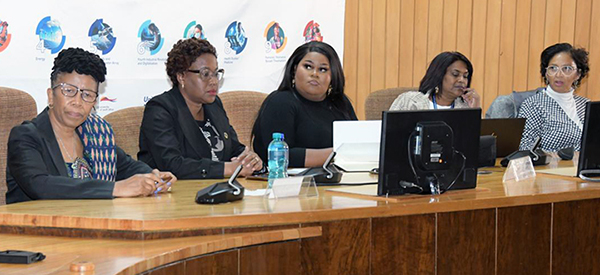
One of the sessions at the recent Unisa Catalytic Niche Area (CNA) Research Symposium, centred on the theme "Defining and reclaiming feminisms in Africa: A quest for wholeness". The session, chaired by Prof Fundiswa Kobo from Unisa’s College of Human Sciences, offered a profound exploration of Feminist, Womanist and Bosadi (African womanhood) Theorisations. The symposium brought together a distinguished panel of scholars, leaders and practitioners dedicated to advancing African feminist thought.

Session chair, Prof Fundiswa Kobo, College of Human Sciences
A term from the Setswana language, Bosadi represents the distinct experiences and struggles of black South African women. By emphasising Bosadi theory, universities can foster a more inclusive academic environment and contribute to broader social justice goals. Kobo highlighted the session’s goal to deepen understanding of feminism, womanism and Bosadi, and to explore innovative ways to advance these discussions. She also mentioned potential collaborations between Unisa, other institutions and various societal organisations.
Prof Madipoane Masenya, Executive Director in the Office of the Principal and-Vice Chancellor at Unisa, defined what the term Bosadi means to her. In her presentation, she explained that the generic Northern Sotho word Mosadi can be used to designate a woman irrespective of her marital status. She also explained the kind of issues that African women specifically in South Africa encounter such as sexisms in the broader society and sexisms on the African culture, post-apartheid, racisms, classism and other issues.

From left: Dr Kefiloe Masiteng, Head of the Resident Coordinator’s Office: United Nations, South Africa; Prof Madipoane Masenya, Executive Director in the Office of the Principal and Vice-Chancellor, Unisa; Prof Fundiswa Kobo, Associate Professor: College of Human Sciences; Prof Darlene Miller, Thabo Mbeki African School of Public and International Affairs; Dr Mbali Mazibuko, Researcher at the University of Johannesburg; and Dr Linda Naicker, Researcher at the Research Institute for Theology and Religion Unisa and South African Coordinator of The Circle of Concerned African Women Theologians
"Therefore," she said, "I am arguing that a Mosadi is a female created in God’s image and that is complete with or without a male human being as marital partner, as a wife without children, or as a mother," she explained. She further added that although women recognise and embrace the African spirit coloniality, a Mosadi still retains her identity as a full human being. Masenya also expressed her aim, which is to make Africa hermeneutically focused and a force to reckoned with.
Dr Kefiloe Masiteng, Head of the Resident Coordinator’s Office: United Nations, South Africa, explained that she had always been a Mosadi before changing her marital status, and that her elders had made her understand what Mosadi really meant. "Gender is not women, but gender is both men and women," she explained. Masiteng shared her passion in woman development and youth development. She further explained that women remain behind in being listened to, being given opportunities and being included in the economy.

The panellists
"When we talk about women in mining or women in agriculture," she said, "it should not be a shock; we should normalise that because women are capable of dominating also in male-dominated industries. The whole issue of feminism and the theories behind feminism are about equality and equity, and at the heart of it is that those that were left behind should be given a chance."
Dr Mbali Mazibuko, Researcher at the University of Johannesburg, dived into what the catalytic niche area of Feminism, Womanism and Bosadi Theorisations stands for her as an academic slay queen, and how it should be conducted. "Bosadi rightfully raises contextual issues for black women, not just in South Africa but in Africa," she explained. "The naming practice might also be palatable and respectable to traditional African values and can go undetected as feminist given the sensationalisation of feminism."
Mazibuko added that she is very suspicious of the centring of African tradition even if it is to challenge it. She cited this example: would Bosadi consider and be able to read generously and carefully the narratives of young black women in South Africa who identify as "slay queens", or would this framework also be able to generously read the narratives of sex workers who are South Africans that come from different tribes? Would some women’s embodiment of femininity unnerve even some of the feminists and basadi?
She continued: "For an institution of higher learning to embrace such a catalytic niche area means for it also to be transformed and challenged by it to truly embed feminisms in how we teach and learn and how we move between lecturer, researcher and student, and create an environment that actively does away with respectability, politics governed by tradition, culture and patriarchal standards. That is what I think the art of feminism and its allies are."
Dr Linda Naicker, Researcher from the Research Institute for Theology and Religion, and South African Coordinator of The Circle of Concerned African Women Theologians, talked about how Unisa could take initiatives to empower women. "To take these initiatives forward should be an exercise that takes place with an African university, particularly the largest African university on the continent, that being Unisa," she explained.
She further explained that taking these theorisations, which are African knowledge systems, would be owning who we are as people. Naicker emphasised the contexts that align with issues that women face and the LGBTIQ community face in Africa, and how Bosadi would be an appropriate lens.
Prof Darlene Miller, of the Thabo Mbeki African School of Public and International Affairs (TM-School), highlighted the changes that the school would bring by promoting and encouraging feminism in their workplace. She mentioned a few ideas that the TM-School already has in place to accomplish their goal of promoting feminism in the workplace.
She continued: "The sector of development that we focus on is the food sector, and our critique of the food sector of the system of food that we have in the country and in the region is that it’s monopolized, racialised and gendered." Miller added that all those different social scales are implicated in the political economy of food, and that indigenous matriarchs have the potential to bring about this change.
After the presentations, Kobo opened the floor to the audience to engage in conversations about the CNA Feminism, Womanism and Bosadi Theorisations. The audience presented some compelling arguments, questions and personal experiences. The symposium underscored the importance of redefining and reclaiming feminist paradigms is crucial for advancing social justice and empowering African women.
The session’s insights provided a valuable foundation for ongoing discourse and research in this vital area of study. The panellists also shared the way forward to make sure that the conversation does not end after the session, but serves to implement and put tools into place to make sure that there is change.
The session successfully brought together diverse perspectives on Feminist, Womanist and Bosadi Theorisations, emphasising the need for a nuanced understanding of feminism in Africa. The discussions highlighted the importance of incorporating local contexts and indigenous knowledge into feminist scholarship to create more inclusive and effective frameworks.
The symposium fostered a space for meaningful dialogue and collaboration, paving the way for future research and activism in African feminist studies.
* By Nomusa Ngema, Intern Journalist, Department of Institutional Advancement
** Photography by Shooheima Champion, Multimedia Centre
Publish date: 2024-09-04 00:00:00.0